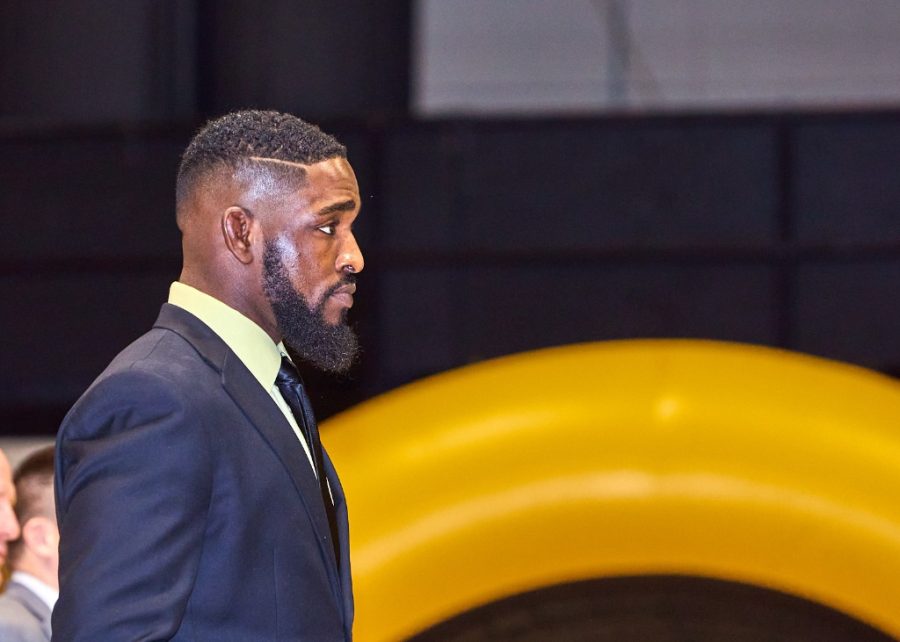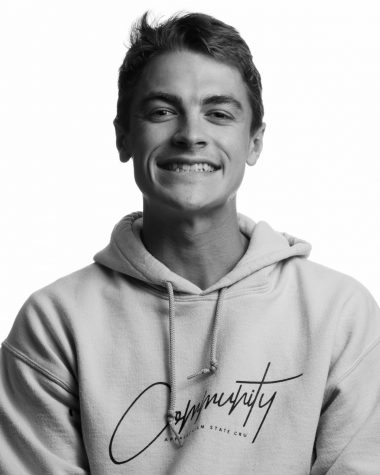Mountaineer wrestling coach continues career, legacy at App State
Randall Diabe, an assistant wrestling coach, competed for App State until his graduation in 2019, qualifying for the NCAA Championships twice and ranking No. 16 nationally by the NCAA Coaches Panel his senior year.
February 9, 2022
The road to becoming a coach at App State was a long one for one assistant on the wrestling team.
Randall Diabe serves as an assistant coach on head coach JohnMark Bentley’s staff. After wrestling under Bentley until 2019, Diabe joined his staff the following season and was promoted to a full-time assistant in October 2020.
“I’ve been loving it,” Diabe said. “It’s been an awesome experience, and I was just grateful that I was able to get the opportunity, and it really helped.”
Diabe’s path to App State and wrestling was far from conventional. After spending the first half of his childhood growing up in Liberia, Africa, Diabe’s family moved to the U.S., settling in Greensboro in 2004.
“It was just a culture shock,” Diabe said. “It was completely different coming from a different area to a whole new country.”
Catching up to his peers in reading and writing was a major struggle for 8-year-old Diabe, and even learning that school was free in the U.S. added to the culture shock.
Joining a school as the new kid from a different country attracted a lot of unwanted attention toward Diabe. He was picked on and ridiculed for being different, he said.
“I was a kid from a different country, so you can just imagine how that went,” Diabe said. “I got picked on just because I was from a different country. It was just really hard.”
Bullies also attacked Diabe for his weight, which led him to sports. He began to escape the criticism in part due to his blooming athletic career.
“I was chunky and a little overweight, and people just picked on me for that,” Diabe said. “As I grew up, I got into sports and things started changing.”
While he dealt with the difficult adjustment to life in America, Diabe found solace in a woman named Paula who helped his family early on. Paula aided the Diabe’s while they established themselves in the U.S. and secured jobs. She served as a mentor to Diabe.
“She helped me figure it out, and she talked to me about the whole U.S. and how things are,” Diabe said.
Diabe’s father worked tirelessly in the U.S., so he relied on many people to help raise his son. Still, the first person Diabe mentions when asked about his role models is his dad.
“It took a village to raise me, so there’s a lot of people out there that deserve credit, and I don’t want to feel like I left them out,” Diabe said. “Obviously, my dad.”
Another major role model for Diabe is Stefan Greenlee, a college teammate of Bentley’s who met Diabe early on. Diabe credits Greenlee for cultivating his love for wrestling and helping to raise him.
“He played a big, big role in my life,” Diabe said. “He’s that one that pretty much got me to a club to help improve my wrestling. He paid for my tournaments and things like that.”
At one state tournament, Greenlee introduced Diabe to his former teammate, Bentley, who earned the head coach role of App State wrestling.
“Honestly, I never knew anything about Appalachian State until that very first encounter with JohnMark, but he was pretty much the only coach that was really showing interest at the time,” Diabe said. “I liked that, and I stuck with him. He was the first one that saw a seed of potential in me and took a risk with me.”
Once in Boone, Diabe steadily became another one of Bentley’s elite collegiate wrestlers. Over his four-year career, Diabe received All-SoCon recognition, multiple unbeaten conference seasons and became a two-time NCAA Championships qualifier while amassing a 77-46 overall record.
As a senior, Diabe went 26-7 and earned an automatic NCAA bid after capturing the SoCon Championship. Diabe graduated in December 2019 and was thankful for Bentley allowing him to accomplish a dream.
“Because of him, I’m the first college grad in my family,” Diabe said. “That’s something that hasn’t been done. With him granting me the opportunity, I was able to get that done.”
Soon after completing his playing career, Diabe was offered a position on Bentley’s staff, serving as a volunteer assistant. In his first season on staff, the Mountaineers secured a Division I-best four shutouts on their way to a 9-3 record. The Black and Gold even produced a program-best six NCAA qualifiers.
App State broke that record in 2021 after sending seven athletes to the NCAA Championships. The Black and Gold even boasted a DI-most five conference champions.
However, coaching means much more to Diabe than posting shutouts or producing NCAA qualifiers. His desire to help others is what initially peaked Diabe’s interest in coaching.
“I had some coaches that actually would go above and beyond being a coach. They spent personal quality time with me and took me out and got me food and things like that,” Diabe said. “From then on, I knew I wanted to help people, but I just didn’t know which route I wanted to go with.”
As one of few coaches of color at App State and the only Black coach on the wrestling team, Diabe’s role expands beyond the traditional roles of a coach. He provides comfort for student-athletes of color who struggled feeling welcome in a predominantly white school and town.
Diabe tries to keep his advice simple, but knows how important of a role he can play in the lives of those athletes.
“Just being there, man. Just giving them the advice,” Diabe said. “We have some associations on this campus … that I sometimes refer guys to. If you’re not feeling 100% in the Appalachian community due to the race difference, there’s also that organization that you can go to that can make you feel part of a community within another community.”
After helping to pave the way for Mountaineer wrestlers of color, Diabe now serves as a mentor to help more like him do the same.











